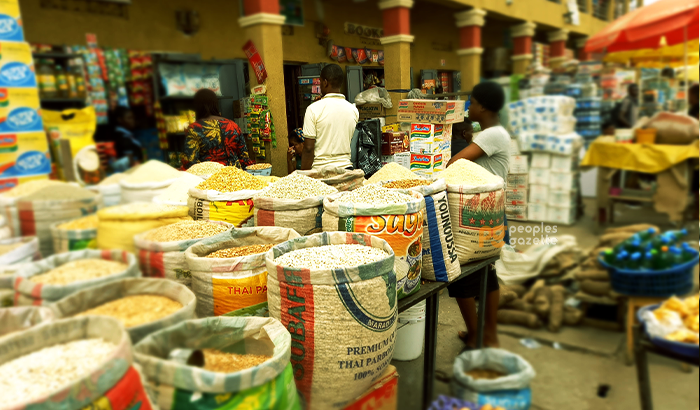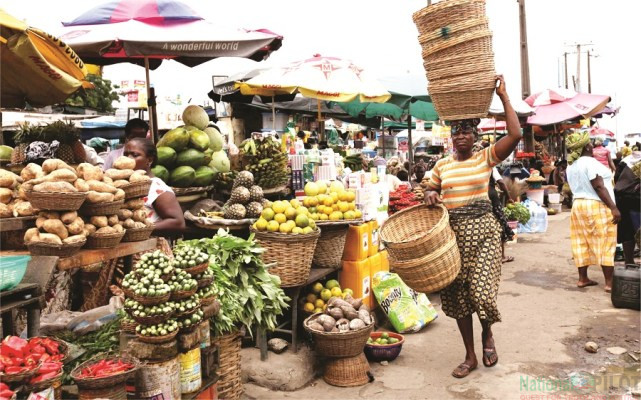Christmas is one week away, but this year, the economic realities have left many Nigerians questioning how they will celebrate.
Uloma Onyemachi of TVC News visited two main marketplaces in Abuja for this report, talking to shopkeepers and consumers about their holiday preparations.
Christmas, which commemorates the birth of Jesus Christ every year, has traditionally been a time for happiness, get-togethers with family, and celebrations.

In order to make the season special, parents and guardians typically use this time to purchase for new products.
But this year, while markets remain busy with activities, one critical question looms: can Nigerians still afford the celebrations amidst the economic challenges?”
Frank Ejike, a shoe vendor Uloma visited, stated that making a profit on his capital investment is his largest issue, not selling.
Other merchants repeated Frank’s dilemma. Prices have changed, according to Mrs. Angela Ibeh, who sells second-hand baby clothes, also referred to as thrift or okrika.
for Christmas celebrations, responders from this market believe simplicity is key for this year’s celebrations
Uloma continued her tour of the Garki market, heading straight to the food section, where staple items like rice, beans, and yams dominate the stalls. But their prices tell a different story—a story of rising costs

Moving through the market, she met Abraham Musa, a frequent visitor, bargaining for more affordable prices.
Musa says his Christmas celebrations will be modest this year, and he wants the government to take action to ease the financial strain.
The situation is no different in other sections of the country, where rising food prices remain an issue.

Christmas is one week away, but this year, the economic realities have left many Nigerians questioning how they will celebrate.
Uloma Onyemachi of TVC News visited two main marketplaces in Abuja for this report, talking to shopkeepers and consumers about their holiday preparations.
Christmas, which commemorates the birth of Jesus Christ every year, has traditionally been a time for happiness, get-togethers with family, and celebrations.

In order to make the season special, parents and guardians typically use this time to purchase for new products.
But this year, while markets remain busy with activities, one critical question looms: can Nigerians still afford the celebrations amidst the economic challenges?”
Frank Ejike, a shoe vendor Uloma visited, stated that making a profit on his capital investment is his largest issue, not selling.
Other merchants repeated Frank’s dilemma. Prices have changed, according to Mrs. Angela Ibeh, who sells second-hand baby clothes, also referred to as thrift or okrika.
for Christmas celebrations, responders from this market believe simplicity is key for this year’s celebrations
Uloma continued her tour of the Garki market, heading straight to the food section, where staple items like rice, beans, and yams dominate the stalls. But their prices tell a different story—a story of rising costs

Moving through the market, she met Abraham Musa, a frequent visitor, bargaining for more affordable prices.
Musa says his Christmas celebrations will be modest this year, and he wants the government to take action to ease the financial strain.
The situation is no different in other sections of the country, where rising food prices remain an issue.

Christmas is one week away, but this year, the economic realities have left many Nigerians questioning how they will celebrate.
Uloma Onyemachi of TVC News visited two main marketplaces in Abuja for this report, talking to shopkeepers and consumers about their holiday preparations.
Christmas, which commemorates the birth of Jesus Christ every year, has traditionally been a time for happiness, get-togethers with family, and celebrations.

In order to make the season special, parents and guardians typically use this time to purchase for new products.
But this year, while markets remain busy with activities, one critical question looms: can Nigerians still afford the celebrations amidst the economic challenges?”
Frank Ejike, a shoe vendor Uloma visited, stated that making a profit on his capital investment is his largest issue, not selling.
Other merchants repeated Frank’s dilemma. Prices have changed, according to Mrs. Angela Ibeh, who sells second-hand baby clothes, also referred to as thrift or okrika.
for Christmas celebrations, responders from this market believe simplicity is key for this year’s celebrations
Uloma continued her tour of the Garki market, heading straight to the food section, where staple items like rice, beans, and yams dominate the stalls. But their prices tell a different story—a story of rising costs

Moving through the market, she met Abraham Musa, a frequent visitor, bargaining for more affordable prices.
Musa says his Christmas celebrations will be modest this year, and he wants the government to take action to ease the financial strain.
The situation is no different in other sections of the country, where rising food prices remain an issue.

Christmas is one week away, but this year, the economic realities have left many Nigerians questioning how they will celebrate.
Uloma Onyemachi of TVC News visited two main marketplaces in Abuja for this report, talking to shopkeepers and consumers about their holiday preparations.
Christmas, which commemorates the birth of Jesus Christ every year, has traditionally been a time for happiness, get-togethers with family, and celebrations.

In order to make the season special, parents and guardians typically use this time to purchase for new products.
But this year, while markets remain busy with activities, one critical question looms: can Nigerians still afford the celebrations amidst the economic challenges?”
Frank Ejike, a shoe vendor Uloma visited, stated that making a profit on his capital investment is his largest issue, not selling.
Other merchants repeated Frank’s dilemma. Prices have changed, according to Mrs. Angela Ibeh, who sells second-hand baby clothes, also referred to as thrift or okrika.
for Christmas celebrations, responders from this market believe simplicity is key for this year’s celebrations
Uloma continued her tour of the Garki market, heading straight to the food section, where staple items like rice, beans, and yams dominate the stalls. But their prices tell a different story—a story of rising costs

Moving through the market, she met Abraham Musa, a frequent visitor, bargaining for more affordable prices.
Musa says his Christmas celebrations will be modest this year, and he wants the government to take action to ease the financial strain.
The situation is no different in other sections of the country, where rising food prices remain an issue.

Christmas is one week away, but this year, the economic realities have left many Nigerians questioning how they will celebrate.
Uloma Onyemachi of TVC News visited two main marketplaces in Abuja for this report, talking to shopkeepers and consumers about their holiday preparations.
Christmas, which commemorates the birth of Jesus Christ every year, has traditionally been a time for happiness, get-togethers with family, and celebrations.

In order to make the season special, parents and guardians typically use this time to purchase for new products.
But this year, while markets remain busy with activities, one critical question looms: can Nigerians still afford the celebrations amidst the economic challenges?”
Frank Ejike, a shoe vendor Uloma visited, stated that making a profit on his capital investment is his largest issue, not selling.
Other merchants repeated Frank’s dilemma. Prices have changed, according to Mrs. Angela Ibeh, who sells second-hand baby clothes, also referred to as thrift or okrika.
for Christmas celebrations, responders from this market believe simplicity is key for this year’s celebrations
Uloma continued her tour of the Garki market, heading straight to the food section, where staple items like rice, beans, and yams dominate the stalls. But their prices tell a different story—a story of rising costs

Moving through the market, she met Abraham Musa, a frequent visitor, bargaining for more affordable prices.
Musa says his Christmas celebrations will be modest this year, and he wants the government to take action to ease the financial strain.
The situation is no different in other sections of the country, where rising food prices remain an issue.

Christmas is one week away, but this year, the economic realities have left many Nigerians questioning how they will celebrate.
Uloma Onyemachi of TVC News visited two main marketplaces in Abuja for this report, talking to shopkeepers and consumers about their holiday preparations.
Christmas, which commemorates the birth of Jesus Christ every year, has traditionally been a time for happiness, get-togethers with family, and celebrations.

In order to make the season special, parents and guardians typically use this time to purchase for new products.
But this year, while markets remain busy with activities, one critical question looms: can Nigerians still afford the celebrations amidst the economic challenges?”
Frank Ejike, a shoe vendor Uloma visited, stated that making a profit on his capital investment is his largest issue, not selling.
Other merchants repeated Frank’s dilemma. Prices have changed, according to Mrs. Angela Ibeh, who sells second-hand baby clothes, also referred to as thrift or okrika.
for Christmas celebrations, responders from this market believe simplicity is key for this year’s celebrations
Uloma continued her tour of the Garki market, heading straight to the food section, where staple items like rice, beans, and yams dominate the stalls. But their prices tell a different story—a story of rising costs

Moving through the market, she met Abraham Musa, a frequent visitor, bargaining for more affordable prices.
Musa says his Christmas celebrations will be modest this year, and he wants the government to take action to ease the financial strain.
The situation is no different in other sections of the country, where rising food prices remain an issue.

Christmas is one week away, but this year, the economic realities have left many Nigerians questioning how they will celebrate.
Uloma Onyemachi of TVC News visited two main marketplaces in Abuja for this report, talking to shopkeepers and consumers about their holiday preparations.
Christmas, which commemorates the birth of Jesus Christ every year, has traditionally been a time for happiness, get-togethers with family, and celebrations.

In order to make the season special, parents and guardians typically use this time to purchase for new products.
But this year, while markets remain busy with activities, one critical question looms: can Nigerians still afford the celebrations amidst the economic challenges?”
Frank Ejike, a shoe vendor Uloma visited, stated that making a profit on his capital investment is his largest issue, not selling.
Other merchants repeated Frank’s dilemma. Prices have changed, according to Mrs. Angela Ibeh, who sells second-hand baby clothes, also referred to as thrift or okrika.
for Christmas celebrations, responders from this market believe simplicity is key for this year’s celebrations
Uloma continued her tour of the Garki market, heading straight to the food section, where staple items like rice, beans, and yams dominate the stalls. But their prices tell a different story—a story of rising costs

Moving through the market, she met Abraham Musa, a frequent visitor, bargaining for more affordable prices.
Musa says his Christmas celebrations will be modest this year, and he wants the government to take action to ease the financial strain.
The situation is no different in other sections of the country, where rising food prices remain an issue.

Christmas is one week away, but this year, the economic realities have left many Nigerians questioning how they will celebrate.
Uloma Onyemachi of TVC News visited two main marketplaces in Abuja for this report, talking to shopkeepers and consumers about their holiday preparations.
Christmas, which commemorates the birth of Jesus Christ every year, has traditionally been a time for happiness, get-togethers with family, and celebrations.

In order to make the season special, parents and guardians typically use this time to purchase for new products.
But this year, while markets remain busy with activities, one critical question looms: can Nigerians still afford the celebrations amidst the economic challenges?”
Frank Ejike, a shoe vendor Uloma visited, stated that making a profit on his capital investment is his largest issue, not selling.
Other merchants repeated Frank’s dilemma. Prices have changed, according to Mrs. Angela Ibeh, who sells second-hand baby clothes, also referred to as thrift or okrika.
for Christmas celebrations, responders from this market believe simplicity is key for this year’s celebrations
Uloma continued her tour of the Garki market, heading straight to the food section, where staple items like rice, beans, and yams dominate the stalls. But their prices tell a different story—a story of rising costs

Moving through the market, she met Abraham Musa, a frequent visitor, bargaining for more affordable prices.
Musa says his Christmas celebrations will be modest this year, and he wants the government to take action to ease the financial strain.
The situation is no different in other sections of the country, where rising food prices remain an issue.















